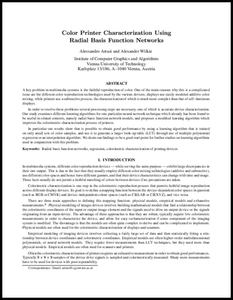Information
- Publication Type: Conference Paper
- Workgroup(s)/Project(s):
- Date: January 2001
- ISBN: 0-8194-3978-9
- Publisher: SPIE
- Note: SPIE Conference, San Jose California, January 2001
- Location: San Jose (USA)
- Booktitle: Proceedings Colour Imaging Conference: Device-Independent Colour, Colour Hardcopy, and Graphics Arts VI, IST&SPIE, Electronic Imaging
- Pages: 70 – 80
- Keywords: neural network, Colorimetric characterization
Abstract
Colorimetric characterization is one step in the colorimetric reproduction process that permits faithful image reproduction across different devices. Its goal is to define a mapping function between the device--dependent color spaces in question (such as RGB or CMYK) and device--independent colour spaces (such as CIELAB or CIEXYZ), and vice versa. The work presented in this paper is an application study of utilizing radial basis function networks for the problem of colorimetric characterization of printer devices. The work we present is novel in seven ways: to begin with, this is the first work that uses radial basis function networks to resolve the colorimetric characterization of printers. Second, we used a new learning model to train such networks; our approach is based on a proposal by Carozza. Third, we use only 125 measured samples for the training of the network. Fourth, the computational costs for this training are very low when compared to previous techniques and allow to use this model in consumer products. Fifth, it is a general model which one can also use to define other transformations between color spaces. Sixth, it is possible to have a fast recharacterization of the device because the computational cost of the training phase and the number of training samples are low. Finally, it improves on the performance of multiple polynomials regression and tetrahedral interpolation.Additional Files and Images
Weblinks
No further information available.BibTeX
@inproceedings{Artusi-2001-Col,
title = "Color Printer Characterization Using Radial Basis Function
Networks",
author = "Alessandro Artusi and Alexander Wilkie",
year = "2001",
abstract = "Colorimetric characterization is one step in the
colorimetric reproduction process that permits faithful
image reproduction across different devices. Its goal is to
define a mapping function between the device--dependent
color spaces in question (such as RGB or CMYK) and
device--independent colour spaces (such as CIELAB or
CIEXYZ), and vice versa. The work presented in this paper is
an application study of utilizing radial basis function
networks for the problem of colorimetric characterization of
printer devices. The work we present is novel in seven ways:
to begin with, this is the first work that uses radial basis
function networks to resolve the colorimetric
characterization of printers. Second, we used a new learning
model to train such networks; our approach is based on a
proposal by Carozza. Third, we use only 125 measured samples
for the training of the network. Fourth, the computational
costs for this training are very low when compared to
previous techniques and allow to use this model in consumer
products. Fifth, it is a general model which one can also
use to define other transformations between color spaces.
Sixth, it is possible to have a fast recharacterization of
the device because the computational cost of the training
phase and the number of training samples are low. Finally,
it improves on the performance of multiple polynomials
regression and tetrahedral interpolation. ",
month = jan,
isbn = "0-8194-3978-9",
publisher = "SPIE",
note = "SPIE Conference, San Jose California, January 2001",
location = "San Jose (USA)",
booktitle = "Proceedings Colour Imaging Conference: Device-Independent
Colour, Colour Hardcopy, and Graphics Arts VI, IST&SPIE,
Electronic Imaging",
pages = "70--80",
keywords = "neural network, Colorimetric characterization",
URL = "https://www.cg.tuwien.ac.at/research/publications/2001/Artusi-2001-Col/",
}


 paper
paper
